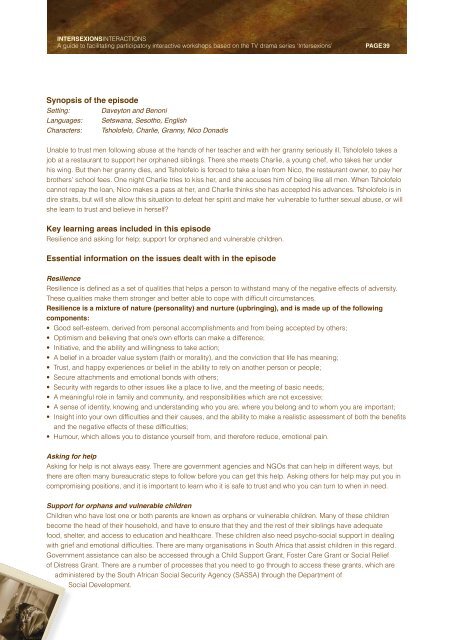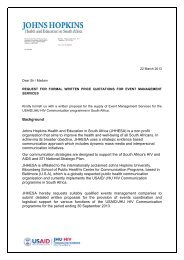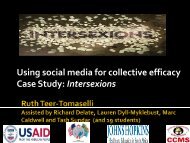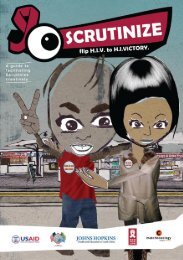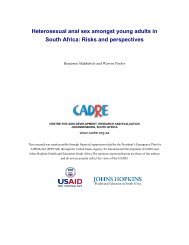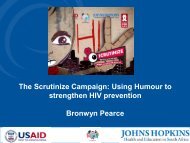Interactions - Johns Hopkins Health and Education South Africa
Interactions - Johns Hopkins Health and Education South Africa
Interactions - Johns Hopkins Health and Education South Africa
Create successful ePaper yourself
Turn your PDF publications into a flip-book with our unique Google optimized e-Paper software.
INTERSEXIONSINTERACTIONSA guide to facilitating participatory interactive workshops based on the TV drama series ‘Intersexions’PAGE39Synopsis of the episodeSetting: Daveyton <strong>and</strong> BenoniLanguages: Setswana, Sesotho, EnglishCharacters: Tsholofelo, Charlie, Granny, Nico DonadisUnable to trust men following abuse at the h<strong>and</strong>s of her teacher <strong>and</strong> with her granny seriously ill, Tsholofelo takes ajob at a restaurant to support her orphaned siblings. There she meets Charlie, a young chef, who takes her underhis wing. But then her granny dies, <strong>and</strong> Tsholofelo is forced to take a loan from Nico, the restaurant owner, to pay herbrothers’ school fees. One night Charlie tries to kiss her, <strong>and</strong> she accuses him of being like all men. When Tsholofelocannot repay the loan, Nico makes a pass at her, <strong>and</strong> Charlie thinks she has accepted his advances. Tsholofelo is indire straits, but will she allow this situation to defeat her spirit <strong>and</strong> make her vulnerable to further sexual abuse, or willshe learn to trust <strong>and</strong> believe in herself?Key learning areas included in this episodeResilience <strong>and</strong> asking for help; support for orphaned <strong>and</strong> vulnerable children.Essential information on the issues dealt with in the episodeResilienceResilience is defined as a set of qualities that helps a person to withst<strong>and</strong> many of the negative effects of adversity.These qualities make them stronger <strong>and</strong> better able to cope with difficult circumstances.Resilience is a mixture of nature (personality) <strong>and</strong> nurture (upbringing), <strong>and</strong> is made up of the followingcomponents:• Good self-esteem, derived from personal accomplishments <strong>and</strong> from being accepted by others;• Optimism <strong>and</strong> believing that one’s own efforts can make a difference;• Initiative, <strong>and</strong> the ability <strong>and</strong> willingness to take action;• A belief in a broader value system (faith or morality), <strong>and</strong> the conviction that life has meaning;• Trust, <strong>and</strong> happy experiences or belief in the ability to rely on another person or people;• Secure attachments <strong>and</strong> emotional bonds with others;• Security with regards to other issues like a place to live, <strong>and</strong> the meeting of basic needs;• A meaningful role in family <strong>and</strong> community, <strong>and</strong> responsibilities which are not excessive;• A sense of identity, knowing <strong>and</strong> underst<strong>and</strong>ing who you are, where you belong <strong>and</strong> to whom you are important;• Insight into your own difficulties <strong>and</strong> their causes, <strong>and</strong> the ability to make a realistic assessment of both the benefits<strong>and</strong> the negative effects of these difficulties;• Humour, which allows you to distance yourself from, <strong>and</strong> therefore reduce, emotional pain.Asking for helpAsking for help is not always easy. There are government agencies <strong>and</strong> NGOs that can help in different ways, butthere are often many bureaucratic steps to follow before you can get this help. Asking others for help may put you incompromising positions, <strong>and</strong> it is important to learn who it is safe to trust <strong>and</strong> who you can turn to when in need.Support for orphans <strong>and</strong> vulnerable childrenChildren who have lost one or both parents are known as orphans or vulnerable children. Many of these childrenbecome the head of their household, <strong>and</strong> have to ensure that they <strong>and</strong> the rest of their siblings have adequatefood, shelter, <strong>and</strong> access to education <strong>and</strong> healthcare. These children also need psycho-social support in dealingwith grief <strong>and</strong> emotional difficulties. There are many organisations in <strong>South</strong> <strong>Africa</strong> that assist children in this regard.Government assistance can also be accessed through a Child Support Grant, Foster Care Grant or Social Reliefof Distress Grant. There are a number of processes that you need to go through to access these grants, which areadministered by the <strong>South</strong> <strong>Africa</strong>n Social Security Agency (SASSA) through the Department ofSocial Development.


